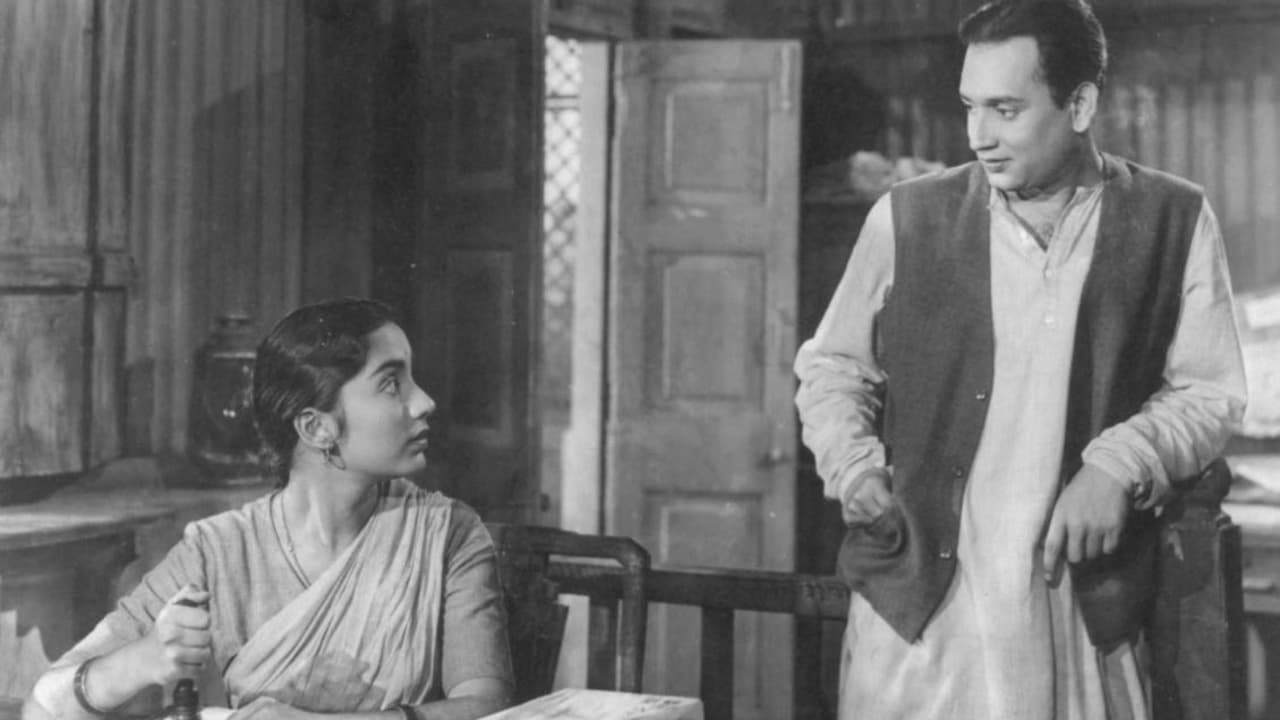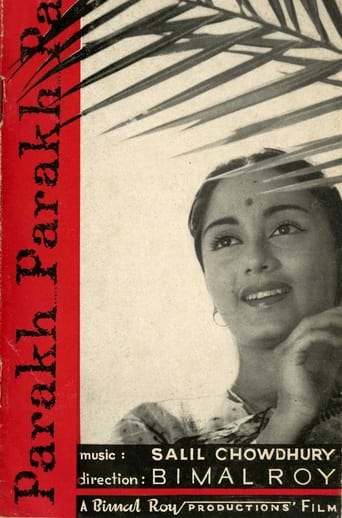

Master director Bimal Roy only had a few more films to make after this before cancer took him at 55 years old, but Parakh was a classic up to his usual standard. His benevolent and improving social conscience never left him and he left behind many such classics: Devdas, Sujata, Madhumati, Do Bigha Zamin to name a few.A poor but honest village postmaster receives his first letter in twenty years to find he is suddenly the temporary trustee for INR 500,000 to be given to the most worthy person in the village. An election ensues to find this worthy and in the main the five previously churlish and snobby candidates now ooze generosity and charity. There's far more to it than simply tales of greed and hypocrisy though and there's a lot going on in here: including love, hate, class prejudices, self-sacrifice, religion, politics and democratic principles being expounded by people who had hitherto disdained it to people who would probably never understand it, comedy and a handful of beautiful songs of course. And it's all expertly done with a thoughtful script and some wonderfully atmospheric photography too. I think this was one of Sadhana's first films and she was perfect in her acting, and in her miming for Lata – the jaunty and bright Mila Hai Kisi Ka Jhumka and the exquisite and dark O Sajana my favourites. If watching pay attention when the five candidates are informed that there's a lot of money in the offing for one of them – it's beautiful to watch as even the hookah smoke freezes in shock!And it's beautiful to see the whole story unfold and unravel even if it's obvious how it's going to end; it's not the most subtle or savage of satires but it's worthwhile, entertaining and not testing to watch at all.
... View MoreFor long, we, the Indians, have been hearing a lot about electoral reforms. However, can the election process actually be reformed when there is so much money involved in this process ? More than five decades back, a movie had been made on the theme of the role of money in the public life of India which, in today's scenario, can be considered as much ahead of its time. It's Parakh (1960).Parakh is a satire on the voting based Indian democratic system in which the resourceful candidates create their vote banks by offering peanuts to the prospective voters. The movie was produced and directed by the legendary filmmaker - Bimal Roy but quite interestingly, the credit of its story has been given to the music director - Salil Choudhary.The story starts with a clean-heart, virtuous and honest postmaster of a village, Raadhanagar who runs the post office with the help of a temporarily kept limping postman, Haaradhan (Motilaal). Postmaster Nivaaran Babu (Nazir Hussain) is worried on many counts. His wife (Leela Chitnis) is ailing and bed-ridden. He had taken loan for the marriage of his elder daughter which he could not repay and now the money-lender has arranged a decree from the court to snatch his house and belongings against the same. His younger daughter, Seema (Saadhana) is unmarried and the money-lender is involved in a conspiracy with a construction contractor (Asit Sen) in the village whose evil eye is on Seema. Seema loves a young school teacher, Rajat (Vasant Choudhary). Nivaaran Babu has to face the unscrupulous priest (Kanhaiyalaal), the cagy landlord (Jayant)and the greedy doctor (Rashid Khan) of the village also who never sit peacefully.In such a scenario, one day a letter comes for Nivaaran Babu, accompanied by a cheque worth Rs. 5 Lakh. The letter is from Mr. J.C. Roy who is a big businessman settled in the city but willing to do something for Raadhanagar because his father had lived there for years before migrating. The letter says to the postmaster that he should handover the cheque to the most upstanding person of the village to spend the money for the welfare of the village. Now seeing the hefty sum, all the high profile people become interested in pocketing the same. Nivaaran Babu and Rajat decide that the decision as to who should be given this money, should be taken through a democratic process. It is agreed to by all that after one month, a voting will take place in the village and all the villagers will vote according to their choice of the most upstanding person of the village. All the big guns alongwith Rajat become candidates for the poll. And now except Rajat, all others start their respective games to woo the villagers so that they cast their votes in their favour. Nobody knows the real identity of J.C. Roy who is actually there in the village itself, living under a different name and with a fake identity.Situations take such a turn that to save Nivaaran Babu from ruins (due to the attachment of his house and belongings under the court order), Rajat takes money from the landlord to repay Nivaaran Babu's loan and in lieu of that he is compelled by the landlord to withdraw his name from the contest. However, his sacrifice is of no use because Seema has already agreed to marry the contractor in return for his paying the loan of her father. On the voting day, all the greedy contestants get involved in illegal tactics to win by hook or by crook and they resort to even violence and terrorizing the voters. Then J.C. Roy reveals his true identity and declares that the most upstanding person in the village is actually the postmaster himself and he has arranged the drama of this cheque to test the integrity and so-called benevolence of the big men of the village and unmask their true faces in front of the commonfolk. He also ensures that Seema is married to Rajat only.Cinematic liberties have been taken and the story has been narrated in a flat way. It may be due to Bimal Da's being a maker of social movies and not mysteries, else he could have kept the suspense regarding the real identity of J.C. Roy till the climax and rendered a dramatic finish to the movie. The motive seems more to tell an interesting story than to convey something hard-hitting. Hence the movie lambastes the individuals and not the system. Romance shown between Seema and Rajat is subtle which stays within the social restraints. However when the jealousy of Seema comes to the fore when Rajat interacts with the sister-in-law of the landlord (Nishi), it underscores a time-tested fact that despite being apparently subtle and silent, love for someone special is bound to be possessive.The movie does not contain slapstick comedy but it has many smile-generating moments. This has been done through dialogs of various characters who unsuccessfully attempt for rhetoric and consequentially turn ridiculous in public. In Salil Chaudhary's music and Shailndra's lyrics, two songs stand out. One is Lata Mangeshkar's immortal rain song - O Sajna, Barkha Bahaar Aai and the other one is also a Lata song, a less talked about one - Mere Man Ke Diye Yun Hi Ghut Ghut Ke Jal.Performances are quite good. However in this movie, the actual hero is the script with all the characters suitably placed. And all the performers have done their bit with finesse.This long forgotten movie seems to have inspired many movies in the times to come. Despite flaws, the movie is a classic and whosoever want to reform the electoral system and the democratic process in our country, should not miss watching this satire. Besides, it can be seen for sheer entertainment as well.
... View MoreLike any typical Hindi movie this one too has a hero and heroin and a love story, but that is where the similarities end and the movie stops becoming stereotypical. This movie has a real lot to offer. It is amazing. The characters have depth (not cardboard, like most commercial films). The story line is complex, there is humor, drama, mystery, and a beautiful love story all intertwined. The complexities of human behavior are explored in a truly entertaining manner, within the context of a tiny scenic village somewhere in India. What is more there is a lovely song as well. The mystery letter keeps us on our toes till the end. People when tempted will display their true colors and it the movie reveals it (even if it is black and white). It is wholesome entertainment for family with high school kids.
... View More